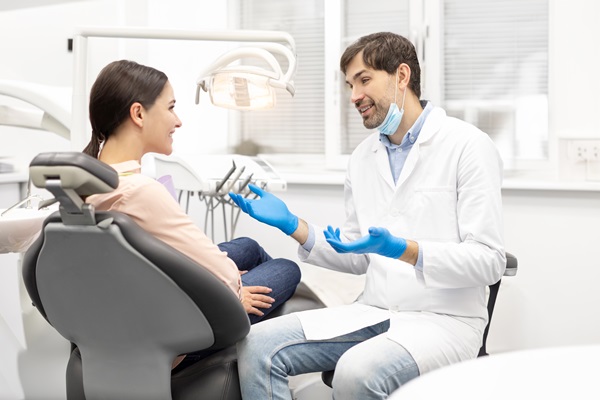What to Expect During a Dental Cleaning

A regular dental cleaning is vital for maintaining optimal oral health. While many people understand the importance of these appointments, the specifics of what happens during dental cleanings may remain a bit mysterious.
The dental cleaning process
In this review, we discuss the procedure of a typical dental cleaning, providing insight into the process and highlighting its significance in preventive oral care.
Greeting and preliminary assessment
A patient's dental cleaning journey begins with a warm greeting from the dental hygienist or dental assistant. Before the cleaning, they may conduct a brief assessment, checking for any changes in medical history, oral health concerns, or medication updates.
Dental X-rays (if necessary)
Dental X-rays may be taken to get a comprehensive view of the patient's oral health. X-rays can reveal hidden issues, such as cavities between teeth, bone loss, or impacted wisdom teeth. However, not everyone requires X-rays during every cleaning, and the frequency depends on individual factors and the dentist's recommendation.
Oral examination
The dental professional will conduct a thorough visual examination of the patient's mouth, gums, and teeth. They will look for signs of gum disease, cavities, oral cancer, and other potential concerns. This visual inspection is crucial for identifying issues that may require further attention.
Plaque and tartar removal
One of the primary goals of a dental cleaning is the removal of plaque and tartar. Plaque is a sticky film of bacteria that constantly forms on the teeth, and when it hardens, it becomes tartar or calculus. Specialized tools, including a scaler, are used to carefully remove these deposits from the surfaces of the teeth, especially in areas that may be difficult to reach with regular brushing and flossing.
Professional teeth cleaning
Following plaque and tartar removal, the dental hygienist uses a high-powered electric toothbrush and gritty toothpaste to do a thorough teeth cleaning. This process cleans and polishes the teeth and helps remove any residual plaque or stains.
Flossing
Flossing is an integral part of a dental cleaning. The dental professional will carefully floss between the teeth to remove any plaque or debris that may be lodged in those tight spaces. This step contributes to preventing cavities and gum disease in areas where a toothbrush may not reach effectively.
Fluoride treatment (if recommended)
Depending on the patient's oral health needs, the dentist may recommend a fluoride treatment. Fluoride helps strengthen tooth enamel, making it more resistant to decay. This treatment often entails applying gel, foam, or varnish to the teeth.
Discussion and education
Once the cleaning is complete, the dental professional may take the time to discuss their findings with the patient. This could include recommendations for improving their oral hygiene routine, advice on proper brushing and flossing techniques, and insights into any potential issues that they observed during the cleaning.
Next steps and follow-up
Based on the cleaning results and any additional findings, the dentist may recommend follow-up treatments, such as fillings, periodontal therapy, or further diagnostic procedures. They will also discuss the recommended frequency for the next dental cleaning, which is typically every six months for those with good oral health.
Contact us to schedule your next dental cleaning
If it has been more than six months since your last cleaning, do not hesitate to contact us. We can schedule a time for your next cleaning, along with a thorough inspection of your oral health overall.
Get more information here: https://www.britesmiles4u.com or call Olga Kandov, DMD - Brite Smiles at (215) 330-5212
Check out what others are saying about our dental services on Yelp: Dental Cleaning in Doylestown, PA.
Related Posts
We all try our best to look out for our oral health, but the only way to truly keep up with our oral health is with preventative care provided by a general dentist. Brushing and flossing and oral hygiene are important, but there is so much that a dentist does that accounts for keeping us…
Most general dentists agree that having a broken tooth is more serious than it gets credit for. It is easy to overlook damage, especially if no pain is associated with it or the damage is not visible. However, leaving a damaged tooth untreated can result in serious consequences. This article will discuss four ways our…
Visiting a general dentist on a routine basis is one of the most important things you can do to maintain your oral and overall health. Routine dental visits allow your dentist to identify and treat any oral health issues before they become more intense and expensive problems in the future. This blog will explore the…
General dentists can perform dozens of different procedures, so they may have a long list of offered services. A general dentist focuses on the prevention (and fast restoration) of oral health issues. However, they may also provide more extensive procedures, such as teeth replacement, when necessary.Some general dentistry services are more common than others. Specifically,…
